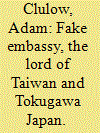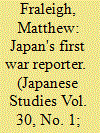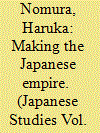|
|
|
Sort Order |
|
|
|
Items / Page
|
|
|
|
|
|
|
| Srl | Item |
| 1 |
ID:
095356


|
|
|
|
|
| Publication |
2010.
|
| Summary/Abstract |
In 1624, the Dutch East India Company established a colony on Taiwan. When Dutch authorities moved to tax and restrict Japanese traders, who had been sailing to the island for a number of years, they encountered immediate resistance spearheaded by Suetsugu Heiz?, a Nagasaki official and merchant heavily invested in the Taiwan route. As part of his struggle against the Dutch, Heiz? attempted to drag the Japanese state into the conflict by engineering a fake embassy formed of 16 aboriginal men recruited from a village in Taiwan and transported to the center of Tokugawa power in Edo. This paper explores the embassy and uses it to consider why powerful Asian states like Tokugawa Japan displayed so little interest in overseas expansion, creating a vacuum of power that European overseas enterprises rushed enthusiastically to fill.
|
|
|
|
|
|
|
|
|
|
|
|
|
|
|
|
| 2 |
ID:
095357


|
|
|
|
|
| Publication |
2010.
|
| Summary/Abstract |
The 1874 Taiwan Expedition was a watershed event for early Meiji journalism, for it was during this conflict that Kishida Gink? (1833-1905) became Japan's first war reporter. At a time when newspapers had only started to become a feature of daily life in Japan, Gink?'s pioneering coverage of the Taiwan campaign was an important demonstration of the newspaper's potential to the Meiji authorities, and his coverage likewise gave many readers their first concrete understandings of the reporter at work. This paper examines Gink?'s extensive writings on Taiwan with the goal of illuminating how the campaign, its setting, and the Taiwanese aborigines were understood by and represented to the Meiji reading public. It shows that more than simply conveying information about the Expedition to the reading public, Gink?'s reportage strove to situate the project as part of a broader colonial agenda that would impart 'civilization' to the indigenous population. In columns that stressed Japan's long-term strategic interests in the area, Gink? called upon his readers to imagine themselves as part of the enterprise.
|
|
|
|
|
|
|
|
|
|
|
|
|
|
|
|
| 3 |
ID:
095358


|
|
|
|
|
| Publication |
2010.
|
| Summary/Abstract |
This paper aims to reconnect the history of modern Japan with that of Japan's colonies by examining debates over the legal inclusion and exclusion of colonial Taiwan in 1899. It examines why and how an inconsistent legal structure evolved within the Japanese Empire. I argue that the creation of the Japanese nation was intertwined with the empire, and that this can be seen in the discriminatory deployment of the Family Register and Nationality Laws. Japan included Taiwan within the scope of the Nationality Law to achieve full sovereignty over its territory but also excluded the colonised people of Taiwan from the family register system to deny them citizenship. The rapid reconfiguration of the idea of 'Japan' under the strong influence of the West added significant ambivalence to this process, and thus to the making of the nation-empire.
|
|
|
|
|
|
|
|
|
|
|
|
|
|
|
|
| 4 |
ID:
095355


|
|
|
|
|
| Publication |
2010.
|
| Summary/Abstract |
In 1593, 1609 and 1616 three very different attempts were made by the rulers of Japan to establish formal diplomatic and trade links with Taiwan. The 1593 approach consisted merely of a letter that proved impossible to deliver, while the others involved sending well-equipped fleets to the island. Both the latter expeditions were led by prominent Christians in efforts that ultimately came to nothing, in spite of being backed up by very meaningful threats of military intervention. This paper argues that it was largely the nature of Taiwan itself that frustrated Japan's schemes. Taiwan had no overall ruler who could participate, willingly or not, in the accepted modus operandi that had been applied to Korea in 1592 and Ryukyu in 1609. This was an approach based on the tributary model. Instead Taiwan's fragmentary structure of aboriginal tribes laid it open to a more western-style form of development involving the establishment of a military base and colonisation, a means that was to be exploited by the Dutch in Taiwan a decade later to the astonishment and rancour of the Japanese
|
|
|
|
|
|
|
|
|
|
|
|
|
|
|
|
| 5 |
ID:
095360


|
|
|
|
|
| Publication |
2010.
|
| Summary/Abstract |
Examining the plight of the Taiwanese, who were pawns in the larger conflict of World War Two, helps us to understand the complicated process of the breakdown of the Japanese empire. The postwar legal adjudication of BC class Japanese war crimes in East Asia is a key element in unwinding the historical complexity of postwar power shifts, the formation of a Taiwanese identity, and its connection to Japan's postwar foreign relations goals. This paper considers three inter-related issues - analyzing how Japanese rule was restructured in the postwar former colonies, dissecting the prosecution of lower-level Japanese war crimes, and resolving the conundrum of collaboration within the former empire. These problems are tied intimately together due to the transformation of postwar identity and colonial politics.
|
|
|
|
|
|
|
|
|
|
|
|
|
|
|
|
| 6 |
ID:
095359


|
|
|
|
|
| Publication |
2010.
|
| Summary/Abstract |
Picture postcards were an important element of Japanese imperial propaganda, though they have yet to receive the scholarly attention they deserve. This paper argues that the Taiwan Government-General played an active role in the production and dissemination of picture postcards to propagate a particular view of life in the 'Aborigine Territory'. To promote ethnic tourism in the wake of the bloody 1930 Wushe Uprising, and to construct Taiwan's majority Han population as 'inauthentic' as part of a wider ideological offensive against China, Japanese colonial postcards portrayed Taiwan Indigenous Peoples as isolated, culturally intact, and indebted to a benevolent state. The most widely circulated picture-postcard images of Taiwan Indigenous Peoples were produced by a coterie that included photographer Segawa K?kichi, publisher Katsuyama Yoshisaku, watercolorist Lan Yinding and Aborigine Affairs Chief Suzuki Hideo. The documentary traces they left behind reveal a series of cross-cutting social and professional ties that bound them together as an 'interpretive community'. Their location in centers of colonial culture, commerce, and government, along with the internal consistency of their vision, well positioned them to not only peddle postcards, but to sell an empire.
|
|
|
|
|
|
|
|
|
|
|
|
|
|
|
|
|
|
|
|
|